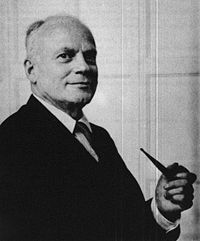Vous pouvez contribuer simplement à Wikibéral. Pour cela, demandez un compte à adminwiki@liberaux.org. N'hésitez pas !
Jacob Viner
| Jacob Viner | |||||
| Économiste | |||||
|---|---|---|---|---|---|
| Dates | 1892-1970 | ||||

| |||||
| Tendance | |||||
| Nationalité | |||||
| Articles internes | Autres articles sur Jacob Viner | ||||
| Citation | |||||
| Interwikis sur Jacob Viner | |||||
Jacob Viner (3 mai 1892 – 12 septembre 1970) est un économiste canadien naturalisé américain. Il a apporté des contributions majeures en économie internationale, en histoire de la pensée économique, et sur la théorie de la firme.
Biographie
Il a surtout enseigné à l'université de Chicago (1916–1917 et 1919–1946) et à l'université de Princeton (1946–1960).
Travaux
Viner est un des pionniers de la Théorie de la firme, et est le premier à avoir distingué les courbes des coûts entre court terme et long terme. En 1937, il publie Studies in the Theory of International Trade, la première histoire intellectuelle du commerce international. Dans The Customs Union Issue (1950), il analyse les unions douanières et fait la distinction entre les effets d'augmentation du commerce et les effets de diversion.
Il a écrit une longue et célèbre introduction à la biographie d'Adam Smith par John Rae.
Bien qu'il ait longtemps enseigné à Chicago, Viner n'était pas membre de l'école de Chicago, dont il ne partageait pas les vues sur le marché. Questionné sur son appartenance à l'école de Chicago, il écrivit ainsi : « Je reconnais l'existence d'une "école de Chicago" et qu'elle était active avant mon départ de Chicago. Mais à aucun moment je n'en ai été membre »[1]
Il reçut en 1962 la prestigieuse médaille Francis A. Walker Medal, délivrée par l'American Economic Association et qui était l'équivalent du Nobel en économie jusqu'en 1969.
Informations complémentaires
Notes et références
- ↑ Lettre à Patinkin, 24 novembre 1969
Œuvres majeures
- 1924, "Canada’s Balance of International Indebtedness", Cambridge, Mass.
- 1925, "The Utility Concept in Value Theory and Its Critics", Journal of Political Economy, Vol XXXIII, Aug., pp369-387, pp638-659
- 1927, "Adam Smith and Laissez Faire", Journal of Political Economy, Vol 35, n°2, pp198-232
- Repris en 1960, "Adam Smith and Laissez Faire", In: Joseph Spengler, W. R. Allen, dir. "Essays in Economic Thought: Aristotle to Marshall", Chicago: Rand McNally, pp305-329
- 1930, "English Theories of Foreign Trade before Adam Smith", Journal of Political Economy, Vol XXXVIII, pp249-301, pp404-457
- 1931, "Cost", In: Edwin R. A. Seligman, dir., "Encyclopaedia of The Social Sciences", Vol IV, New York: MacMillan
- 1936, "Mr. Keynes on the Causes of Unemployment"; Quarterly Journal of Economics, Vol 51, n°1
- 1937,
- a. "Studies in the Theory of International Trade", New York: Harper (en)[lire en ligne]
- b. Commentaire du livre de John Maynard Keynes, "General Theory", Quarterly Journal of Economics, Vol 51, pp147-167
- Repris en 1960, "Mr. Keynes on the causes of unemployment", In: Henry Hazlitt, dir., "The Critics of Keynesiaian Economics", Princeton, N.J.: Van Nostrand, pp46-65
- c. "English Currency Controversies, 1825-1865", In: Jacob Viner, dir., "Studies in the Theory of International Trade", Chap. 5, New York: Harper
- 1938, commentaire du livre de Marian Bowley, "Nassau Senior and Classical Economics", The Economic Journal, Vol 48, n°190 (Jun.), pp283-285
- 1950, The Customs Union Issue
- Dumping: A problem in international trade, 1923.
- Canada's Balance of International Indebtedness: 1900- 1913, 1924.
- Trade Relations Between Free-Market and Controlled Economies, 1943.
- A Modest Proposal for Some Stress on Scholarship in Graduate Training, 1950
- International Economics, 1951.
- 1945, "Clapham on the Bank of England", Economica, New Series, Vol 12, n°46, May, pp61-68
- 1949, "Bentham and J. S. Mill: The Utilitarian Background", The American Economic Review, Mar., Vol 39, n°2, pp360-382
- Repris en 1952, "Viner on Bentham and Mill", In: Henry W. Spiegel, dir., "The Development of Economic Thought: Great Economists in Perspective", New York: Wiley, pp202-225
- 1952, "International Trade and Economic Development",
- 1954, “Schumpeter’s History of Economic Analysis”, American Economic Review, Vol 44, n°5, pp894–910
- 1960, "The intellectual history of laissez-faire", Journal of Law and Economics, 3, pp45-69
- 1961, Hayek on Freedom and Coercion, Southern Economic Journal, XXVII (3), janvier, pp230-236
- Repris en 1999, In: The Legacy of Friedrich von Hayek, Peter J. Boettke, Dir., Aldershot, UK: Edward Elgar Publishing, pp306-312
- 1972, "The Role of Providence in the Social Order: An Essay in Intellectual History", Philadelphia: American Philosophical Society
- 1978, "Religious Thought and Economic Society: Four Chapters of an Unfinished Work", History of Political Economy, 10(1), printemps
Littérature secondaire
- 1973, Joseph Spengler, commentaire du livre de Jacob Viner, "The Role of Providence in the Social Order: An Essay in Intellectual History", Journal of Economic Literature, Vol 11, n°4, Dec., pp1376-1377
- 1991,
- D. A. Irwin, "Jacob Viner, essays on the intellectual history of economics", Princeton: Princeton University Press
- Paul Samuelson, "Jacob Viner", In: Edward Shils, dir., "Remembering the University of Chicago: teachers, scientists, and scholars", Chicago : University of Chicago Press, pp533-547
- 1994, Terence W. Hutchison, "The wisdom of Jacob Viner: ‘Outstanding All-rounder’, and Profound and persistent Methodological Critic", In: Terence W. Hutchison, dir., The uses and abuses of economics, Contentious essays on history and method, London : Routledge, pp260-281
Voir aussi
Liens externes
- (en)Présentation de Jacob Viner
- (en)Studies in the Theory of International Trade New York: Harper and Brothers Publishers, 1937.
| Accédez d'un seul coup d’œil au portail économie. |